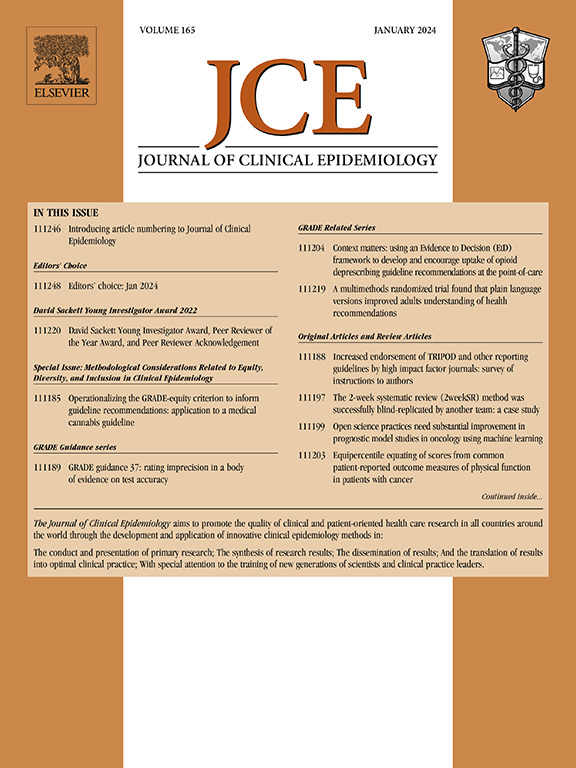GRADE concept paper 9: rationale and process for creating a GRADE Ontology
IF 5.2
2区 医学
Q1 HEALTH CARE SCIENCES & SERVICES
引用次数: 0
Abstract
Context
As the rate of research production accelerates, the ability to efficiently and unambiguously communicate judgments relating to the synthesis, evaluation, and use of scientific information becomes paramount.
Perspective
Scientific information can be viewed as a “layered infrastructure” of data, evidence, knowledge, and use. The GRADE approach serves as a de facto data standard for this infrastructure, supporting movement between layers by reducing ambiguity in claims to knowledge (in the form of judgements of certainty in the evidence when answering research questions) and level of commitment to possible solutions to problems (in the form of strength of recommendations for interventions).
Purpose
This GRADE concept paper outlines the structure, purpose, and potential benefits of the GRADE Ontology for (a) the creators of, educators in, and users of systematic reviews, health guidelines, and health technology assessments, and (b) the development of tools that help with conducting, finding, and summarising the same. This paper also presents the processes for the development and maintenance of the GRADE Ontology, a formalised terminology standard within GRADE that will support the efficiency, rigour, consistency, and interoperability of GRADE's use.
Plain Language Summary
The rate of research production is increasing exponentially. It is therefore becoming increasingly important to quickly, efficiently, and unambiguously communicate the judgments made and processes used when doing research and using evidence to inform policy decisions. GRADE is a widely used approach to assessing certainty of evidence when answering research questions and making recommendations for health interventions, designed to help with the efficient and transparent evaluation and use of evidence. However, the absence of a formalized terminology standard within GRADE limits the efficiency with which the results of its use can be communicated. In response, the GRADE Ontology is being created. This concept paper outlines what an ontology is, how it helps with communicating scientific information, the specific benefits of the GRADE Ontology, and the processes for developing and maintaining a useful, valid ontology that supports the use of the GRADE approach.
GRADE概念论文9:创建GRADE本体的基本原理和过程。
背景:随着研究产出的速度加快,与科学信息的综合、评估和使用有关的判断的有效和明确的沟通能力变得至关重要。观点:科学信息可以被视为数据、证据、知识和使用的“分层基础设施”。GRADE方法在该基础设施中充当事实上的数据标准,减少了知识主张(在回答研究问题时对证据确定性的判断形式)和对问题可能解决方案的承诺水平(以干预建议强度的形式)的模糊性。然而,在GRADE中缺乏正式的术语标准限制了使用它的效率、严谨性、一致性和互操作性。目的:这篇GRADE概念论文概述了GRADE本体对系统评论、健康指南和健康技术评估的创建者、教育者和用户的潜在好处,以及帮助进行、发现和总结这些内容的工具的开发。本文还介绍了GRADE本体的开发和维护过程。
本文章由计算机程序翻译,如有差异,请以英文原文为准。
求助全文
约1分钟内获得全文
求助全文
来源期刊

Journal of Clinical Epidemiology
医学-公共卫生、环境卫生与职业卫生
CiteScore
12.00
自引率
6.90%
发文量
320
审稿时长
44 days
期刊介绍:
The Journal of Clinical Epidemiology strives to enhance the quality of clinical and patient-oriented healthcare research by advancing and applying innovative methods in conducting, presenting, synthesizing, disseminating, and translating research results into optimal clinical practice. Special emphasis is placed on training new generations of scientists and clinical practice leaders.
 求助内容:
求助内容: 应助结果提醒方式:
应助结果提醒方式:


